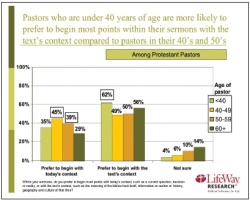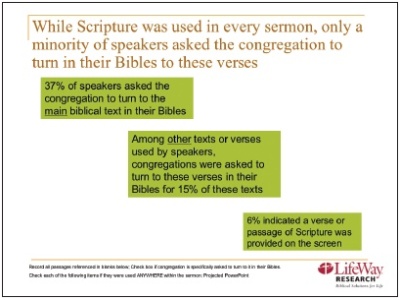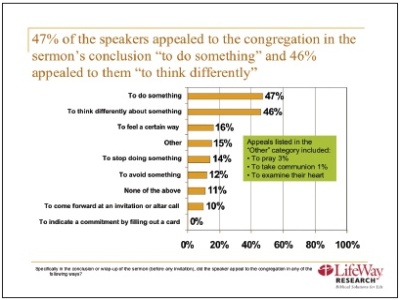Sermons that Stick
You can't spend 30 minutes each week with every person in the church personally applyng God's Word to God's people, but you do have an opportunity to open up the Word of God and speak into their lives.
Published Nov 22, 2009

Churches have changed dramatically during the past 50 years. Our music is different. In many locations, pews have been replaced with chairs. Technology has revolutionized the way we conduct our services.
However, some things haven't changed. One constant that remains essential in every church is preaching. I've heard preaching called "the rudder that moves the church." I think it is an apt description.
Most of you have 30 to 45 minutes each week to speak into the lives of every person who attends your church. You can't spend 30 minutes each week with every person in the church personally applyng God's Word to God's people, but you do have an opportunity to open up the Word of God and speak into their lives each week. It is the prospect that all teaching pastors have to make a message stick because they are applying eternal truth to earthly circumstances. The hope is that the time is used by God to shape lives and influence the direction of the congregation by clarifying who God is, what He wants from us and what He has done for us in Christ.
Merely preaching a sermon is not enough. Truth encountered and truth remembered will result in truth applied. You want people to encounter not just persuasive words, but our persuasive Savior. To borrow a book title from business marketers Chip and Dan Heath, we want to deliver sermons that are "Made to Stick."
People are distracted by thoughts of office projects, family commitments and weekend football. They often miss the message. Our goal must be to engage them spiritually when they are present physically. How do you do that?
Let me suggest four ways to engage your listeners with God's Word during your sermons: Enter their world, open the book, pull back the curtain and call them to respond.
LifeWay Research recently completed two surveys for Preaching magazine designed to shed light on how pastors are preaching. For the first survey, conducted February 2009, we interviewed 1,000 randomly selected senior pastors, ministers and priests of Protestant churches in America about their preaching practices.
The second survey was designed to understand sermon content. We randomly selected 450 sermons from two prominent online sources for audio sermons. The sermons all were delivered by different preachers between Aug. 31 and Sept. 14, 2008. Our research team listened to each sermon, then answered objective questions about how the preacher engaged the congregation during the sermon. While this second survey is a healthy sample of sermons that pastors uploaded to Web sites, it can describe only those specific sermons. We cannot tell for sure if or how they differ from pastors' sermons that were not uploaded.
I was happy to see that this research demonstrated an overlap of ideas for connecting one's preaching to the lives of the people in the church. More detail on the questions and breakouts of the responses are available online at lifewayresearch.com. The four engagement methods showed up repeatedly in the surveys.

1. Enter Their World
Preachers who engage their listeners consider what their world looks like. Jesus did that. Preaching to a mostly agrarian society, His sermons were full of plowing, sowing and reaping analogies. He knew His culture, and He preached into that culture.
Paul followed a similar pattern. In his sermon at Mars Hill, recorded in Acts 17, Paul appealed to his listeners' own spiritual system, to their "unknown god." He also consistently used athletic imagery to capture the attention of his hearers. The Greek culture was obsessed with fitness and athletics. Paul's references to contests (1 Thessalonians 2:2) and winning (Philippians 3:14) were designed to enliven the imagination of the engaged mind and gain the attention of the wandering mind.
How can we do the same today? Capturing the attention of contemporary listeners without trivializing our message is a delicate balance to strike. Popular culture constantly is engaged and experienced via a deluge of media; but we can provide rich, attention-grabbing ideas that create a bridge to God's Word.
Entering the world of your listener may be as simple as starting your sermons with their personal context. Learn to ask the right questions in preparing your messages. How does the text interact with their lives? What real-world questions do they bring to church with them? What distracts and hinders them from obeying this text?
My preference is to take them to the text—by introducing them to why the text matters to them. According to our surveys, many of you are doing just that: The survey of pastors' preferences showed that 37 percent prefer to start their sermons with their listeners' context by addressing issues, such as a current question or decision their listeners are facing. Preachers in their 40s and 50s are most likely to do this. On the other hand, only a third of pastors under 40 prefer to start their sermons with their listeners' context.
My guess is that many people say, "I start with the text," but they do so with some contextual introduction. It's what I like to do, as well. I would prefer to stand up, read a verse and say, "No donuts, no coffee, just the Bible…come and get it"; but I realize humans—even our church attendees—are looking for the "So what?" factor in everything. To better engage your listeners, connect their daily context with the eternal Word. I think it matters that the text sets the agenda of our message and we find contextual ways to help people see why it always matters.
This reality may be reflected in the other study, the one focused on the actual sermons preached, which found that more than half (52 percent) of preachers started most of their sermon points with today's context. It's safe to say more than half our preachers are at least attempting to address the ever-changing needs, struggles and issues of today with the unchanging truth of the Bible.
That's good. We don't have to make the Bible relevant; it already is. We do, however, have a responsibility to help people understand the Bible's relevance as we preach. Connecting with today's context does just that.

2. Open the Book
Entering our listeners' world is only as meaningful as we make the connection between their world and God's revelation. Majoring on heart-stirring stories, transparent confessions and motivational injunctions are the paths of least resistance for speaking; a sermon devoid of the Word will not "stick" in a person and result in lasting transformation. Only the Spirit and the Word can do that.
Paul says in 1 Corinthians 2:4-5, "My speech and my proclamation were not with persuasive words of wisdom, but with a demonstration of the Spirit and power, so that your faith might not be based on men's wisdom but on God's power."
All of us want our preaching to have power—real power, but that only comes through the Word of God.
The point I'm making is to open the Book, but you cannot forget to open their hearts to the Book. The preacher should invite the listener to engage in the Scripture, and this involves more than being an expository or text-driven preacher.
How often do you have your listeners actually turn to the passages and read them as you preach? Sure, it complicates your sermons. You might be able to get one more point or illustration into your sermon time if you just read the Word without waiting for your listeners to look up the text themselves, but is it worth the cost of a passive listener?
Asking your listeners to read the actual text of Scripture brings them into contact with the Word of God and helps engage them with your message, as well. When listeners turn to the passage you're preaching about and read it for themselves, they think through what God might be telling them.
In the second study, preachers only asked listeners to turn to their primary texts in 37 percent of the 450 sermons. When preachers mentioned other verses, they only asked listeners to turn to those passages 15 percent of the time. Another 6 percent referred to biblical passages displayed on a screen for their audience to read. The research supported the notion that perhaps more of us need to be sending people to the Word when we preach. We need to be mindful that the advent of video projection, PowerPoint and all the rest are wonderful—to a point. Technological advances never should become surrogate participants for worshipers.
Do you point people to the Scripture as you preach? Your authority as a preacher comes from one source—the Word of God.
Your power to speak into the lives of your listeners comes from His Word, as well. Look for opportunities to point people to the Bible as you preach.

3. Pull Back the Curtain
If you want your sermon to stick, you must pull back the curtain to reveal who God is, who we are and what He really wants. It is too easy for preachers to slip into becoming moral teachers—religious instructors who pass out rules for spiritual living without pulling back the curtain on God and ourselves; pulling back that curtain is what our people need the most!
Your hearers need a clear word about exactly who God is in His character, work and will. People have come to worship with
assumptions, presuppositions and all kinds of religious baggage that wrongly has informed their view of God's character and what
He wants from us. It is only the Word of God rightly explained that can show them the truth and confront these misunderstandings.
I'm not just talking about pulling back the curtain on who God is, but who we are, as well. Many need to see they are not what they
believe themselves to be. Some need to be confronted with the hard truth that they are, at bottom, corrupt and ruined by sin. Others
need to see they are created in the image of God and were made to know and enjoy Him. Yet others must come to grips with the fact that their faith is dead, and they are asleep in their faith.
Here's the thing: You cannot pull back the curtain unless you can exegete their world (point 1) and exegete Scripture (point 2).
While our study did not focus on these areas, I suspect they are areas of weakness in much of our preaching. We need to avoid
preaching mere ought-to and how-to messages, and instead preach law and Gospel together. This displays God as He is, His law for our lives, our fallen nature and how God offers us grace in Christ. In pulling back the curtain, we then can focus on the need for our hearers to respond to all that God has revealed in His Word.
4. Call for a Response
Preaching never should aim merely at the head, but also at the heart and will. Intellectual preaching changes the mind for a while.
Convictional preaching changes the heart for eternity. God gave us His Word that we might be transformed, not just informed.
Therefore, solid preaching always calls for a response.
On the simplest level, this response is faith and repentance. We are called to leave something and believe something; but calling for
faith and repentance is only helpful when it is specific, clear and seen in light of the gospel.
Jesus constantly was asking people for a response to His message. From the very beginning of His ministry, He gave specific instructions about how to live as a disciple. From "come and follow Me" to the Great Commission, Jesus didn't just give His hearers talking points; He invited them to Himself and His kingdom. The first call from Christ is to transformation through personal relationship.
Most pastors say they typically ask their listeners to respond in some way as they preach. Make sure to ask for active participation
during your sermons. We presented Protestant preachers with four typical responses to their sermons: providing sermon outlines; asking congregants to repeat a phrase or word; asking them to answer a question aloud; and asking them to raise their hands in response to a question. Four out of five pastors said they regularly use at least one of these methods.
Involve the congregation in repeating phrases from the text or provide a sermon outline for participants to fill in the blanks. The
simplest (or liturgical) exercises help the congregation take part in the message. It takes listeners one step closer to applying the
Word of God.
Despite the relatively high percentage of pastors who say they use at least one of these methods, the vast majority of sermons
we studied in the second survey didn't use response methods. Only 9 percent of those preachers asked their listeners to respond
to a question aloud. Even fewer asked listeners to repeat a word or phrase (7 percent) or answer a question by raising their hands
(6 percent).
As pastors, we often need help in the battle of perception versus reality with our preaching. If these latter statistics hold true, preachers are not engaging their listeners as well as they think. One way to get an accurate assessment of your preaching would be to design a growth plan that includes self-evaluation and outsider assessment of your preaching. I also would suggest you pair up with a friend in the ministry and swap audio or video files of your messages. A close friend can tell you where you've missed the mark and build you up at the same time.
There is another reason this matters: Preaching that doesn't elicit listener response in some way—even in a tiny way—makes for
passive listeners. Passive listeners at church will make for passive Christians in the world. That's the opposite of our goal for engagement—and the opposite of what biblical preaching is.
Passive listeners who aren't even making small responses to your sermon might not make the more important responses later. Teach
your people to respond to the text, not watch it pass by them.
Response is the natural result when the Word is presented. Paul tells us in 2 Timothy 3:16-17, "All Scripture is inspired by God and is profitable for teaching, for rebuking, for correcting, for training in righteousness, so that the man of God may be complete, equipped for every good work" (HCSB). The Word of God you preach is intended to do something in our lives. So do not hesitate in asking your listeners to do something with what they've heard.
James tells believers that we are to "be doers of the word and not hearers only" (James 1:22). To engage people with His Word is what God intended. Though God desires for us to be informed with truth, He intends for us to be formed with it, as well. Our hearers should become "doers of the Word."
A call to respond is biblical, but it's also practical and specific. In my book Lost and Found: The Younger Unchurched and the
Churches that Reach Them (B&H), we reported some unfortunately startling statistics when it comes to young adults and their
openness to the church. I say "unfortunately" because we too easily have acquiesced to a false mythology of young adults' spiritual interest in America. One of the things we found is that young adults—particularly churched young adults—want to know how to apply God's Word in their everyday lives. They don't just want to listen to you talk for 30 minutes. They want to be challenged to do something with what they're hearing. Many of the preachers did this in the sermons we studied. Close to half (47 percent) asked their listeners to do something at the end of their sermons. Forty-six percent asked listeners to think differently and another 16 percent asked listeners to feel something different when they were finished.
What kind of things did preachers ask listeners to do? Nearly 15 percent asked them to stop doing something. As they concluded
their sermon, 10 percent asked listeners to respond by coming forward during an altar call. Small numbers asked for listeners to fill
out a response card or take communion. To what are these numbers adding up?
Often preachers have an application in mind as they prepare a sermon. We intuitively can see what would happen if listeners acted on what they've heard from the Word, but too often we leave this application unsaid. I challenge you to think consciously about what you want your listeners to do with your message. Ask yourself, "If my best friend was listening to this message, how do I want his or her life to change because of what I'm going to say?" Don't just answer the question in your head before you preach again. Voice that application in your message. Don't settle for the hope in your head. Seek commitment in your church.
Engaging listeners with your sermon is not optional; it is a must. People hunger for truth. The surveys we've done have
shown that the unchurched—even the lost—long to hear a word from heaven. When we studied unchurched young adults for
Lost and Found, we uncovered that many of them want to know more about the Bible. While God can use any situation for His glory, it will be hard for your listeners to hear from heaven if you don't challenge them to become more than passive listeners.
The people who listen to you every week need to know what God wants to say to them. When you are not heard, the consequences for your listeners are real. The lost face a Christless eternity. Many believers face overwhelming personal and
professional struggles. All of them long to know that God cares enough about them to speak into their lives. Through your
faithful preaching of the Word, they can find out.
In his book Communicating for a Change: Seven Keys to Irresistible Communication (Multnomah), Andy Stanley says he
often gives himself a pep talk before he preaches a message by asking, "How would you communicate this message if your
18-year-old son had made up his mind to walk away from everything you had taught him morally, ethically and theologically—
unless he had a compelling reason not to?" It's a stunning question that would force any of us to engage our audience.
If your 18-year-old son was in that situation and listening to the sermon you are preparing now, what would you want him
thinking about? Would you want his mind to drift to college applications, his girlfriend or the big game on Friday night? Or would you want him to be engaged with the Word of God asyou preached?
Someone's son, father, wife and daughter will be sitting in your audience next weekend. Will what you say stick? What will you do to take your preaching to the next level? Will you engage them with the Word of God?
Perhaps most importantly, when will you start?
Originally published November 23, 2009.







